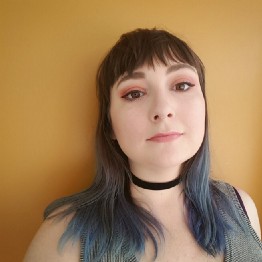How it works:
Share your skin goals and snap selfies
Your dermatology provider prescribes your formula
Apply nightly for happy, healthy skin
How it works:
How it works:
Share your skin goals and snap selfies
Your dermatology provider prescribes your formula
Apply nightly for happy, healthy skin
How it works:
Why inclusivity in skincare matters
What body positivity means for brands



I’m going to be honest with you, when Curology asked me to write about social responsibility in the skincare industry, I was super nervous. What diversity and inclusion means to you is probably different from what it means to me, because everyone has their own lived experiences.
Last week, Natasha, a fellow writer at Curology, said to me, “Everyone has skin, yet skincare is individual. That’s why it’s so interesting.” This stuck with me. Despite being a total geek for skincare for my own purposes, I’ve learned so much about the beauty industry since joining Curology. While, over the years, I’ve gotten to know my own skin well, trying to write objectively about everyone’s skin is impossible.
On the other hand, the topic of inclusivity is extremely close to the Curology brand. As a teledermatology innovator, Curology was founded with the simple mission of making medical grade skincare widely accessible and affordable.

Of course, when it comes to diversity, it goes a lot deeper than selling products.
What is diversity?
Literally, diversity means a whole that is made up of “differing elements or qualities.” Generally, when we talk about diversity, we’re talking about groups of people in specific contexts; for example, you may have even attended at least one “importance of diversity in the workplace” seminar in your professional career. Ultimately, diversity broadly describes a group’s characteristics rather than its dynamics; even a diverse group of individuals can feel isolated if people feel tokenized, silenced, or otherwise pushed to the side.
Inclusivity means the act of including others in a way that contributes to overall harmony. Inclusivity exists in terms of group dynamics, but also in terms of the way individuals interact with each other. Yes, inclusivity means representation, but it also means fostering diversity in a genuine way, which is all about seeing people in their contexts. I know I’m getting a little abstract, here, but stick with me — there’s a point, I promise!

The impact of industry
The beauty industry sends all sorts of messages about the products our skin needs to be desirable; while it’s impossible to know how insidious the intention of advertisers may be, the disempowerment implicit in the messages of advertising often astounds me.
Advertisers spin fantasies of beauty and perfection; all too often, body shaming is the instrument used to get people to buy. Now that social media has transformed personal identities into brands, we’re constantly inundated with both old school airbrushing and new school face tuning — altered images of reality that, together, create an impossible standard of “beauty.” When these images are paired with products, the intent is to make us feel the need to buy products we otherwise would have never known about.
When you break down the messages at beauty industry sends regarding skin diversity, it’s even worse. For example, women of color with deep complexions are not only underrepresented, but black women being positioned as a negative contrast to white women is one of the most insidious, yet persistent, advertising tropes. Just Google image search “racist Dove ads” if you don’t believe me; you’ll find multiple examples.

In terms of social impact, the rise of consumer culture has created mass implications for mental health. While trying to suss out whether unhappiness stokes materialism or vice versa is a bit of a chicken-and-egg scenario, a recent study on consumer escapism found a link between an increase in anxiety and impulse shopping.
Meanwhile, according to the American Psychological Association, “the differences in life satisfaction between more and less materialistic people are relatively small.” In other words, there’s not much correlation between what you own and your long-term personal happiness.
Acne positivity and inclusive beauty
The body positive movement is nothing new, but social media has made it more visible than ever. If your Instagram feed looks anything like mine, you’ve seen a lot of body positive media to off-set the negative messages of beauty industry advertising.

I know what you’re thinking — selfies are not a form of protest. And, honestly, I agree with you. But I do know that I, like many 21st century women, have reconciled my relationship with my body through the lens of my own selfies. If you’re one of the millions of people with body dysmorphia, having your picture taken can make a huge impact on your self-confidence — for better or worse. For example, there might be a link between slimming and smoothing camera filters and triggering repetitive behaviors of BDD, as well as an increased demand for plastic surgery.
I first started learning about the unreality of selfie filters a few years ago, when I discovered that the camera in my phone was applying filters over my images without my even knowing it. Of course, this is also when I was getting super into makeup and posting selfies on Instagram all the time. When I look back at these pictures, I feel insecure — even though I look beautiful in the photos, is it even me I’m looking at?
The skin positivity movement is a new subgenre of body positivity that encourages skin acceptance; while acne positivity is the most visible, skin positivity also fights against the stigma of skin conditions such as vitiligo, stretch marks, and hyperpigmentation — among others. It’s a much needed breath of fresh air in an industry that wants to make poreless skin the standard, even knowing it’s impossible to obtain.
Emotional invincibility over physical perfection
While Curology’s mission began with making skincare more accessible and inclusive for people who couldn’t get to a dermatologist’s office, the implications of this value have a wide reach. For example, Curology ads use unaltered and makeup-free photos that often show real signs of acne and aging. We also rarely use models; those who work for our creative team are usually the ones who are in it. That doesn’t mean we’re perfect! Our employees mostly fall within a certain age range, for example, and we definitely don’t think SF is the center of the world — but we’re trying every day to be more honest. Trying to sell you an unobtainable standard doesn’t align with Curology’s ethical values, which are to normalize (and celebrate) stigmatized skin conditions, and never, ever body-shame anyone. We want to set trends, not follow them. That’s why we’re always honest about the skincare industry, and, as dermatology enthusiasts, we believe in the Hippocratic oath: first, do no harm.

Click here to start a free trial (plus shipping and handling) of Curology.

Stephanie Papanikolas